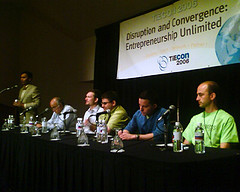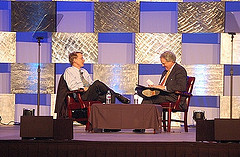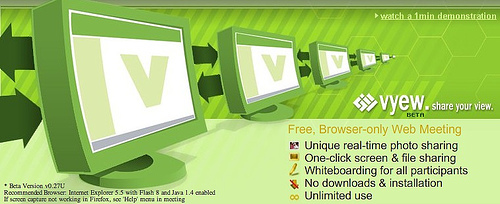Liveblogging Mike “TechCrunch” Arrington‘s Web 2.0 – Why Now? panel at TiEcon 2006. (note: I am obviously publishing this, as well as other TiEcon posts after the Conference, but will only do very basic editing, and some linking, essentially posting my original notes. My added comments appear in italics)
Panelists:
- Manish Chandra: Founder, CEO Kaboodle, 5 jobs so far, started at Intel, then 4 startups
- Emily Melton: Associate, Draper Fisher Jurvetson. Left DFJ in 2002, re-joined 2005
- Kevin Rose, Founder, Digg. Prior to that Hosted national TV program, TechTV
- Tony Conrad, Founder, CEO Sphere, also Investor
- Jeff Nolan, SAP , Apollo Group,the “Attack Oracle” team (he actually has this on his business card), until recently with SAP Ventures, top blogger.
Mike: For warmup, let’s talk about the individual companies. Kaboodle is basically bookmarking, social shopping. Statistics show that 80% of all Internet activity is research, not transactions. Kaboodle does not close deals, trying to make money on research side. How did Manish come to the idea?
Manish: Was remodeling home, a lot of pain to find stuff – hence the idea (do all consumer sites really start based on personal experience, or are these just sellable stories?)
Emily: Since she is a VC, will talk about a portfolio company that she’s a Board Member of: Tagworld. Mike: That’s a little startup that’s going up against MySpace and others – how can it have any chances? (The little guy vs. big guy issue came up in the morning session as well) and Emily’s reaction is similar: people want to have presence on the web, relationships ..etc – Tagworld provides tools.
Mike: Huge fan of Digg:. 50% of TechCrunch’s traffic comes from digg. TechCrunch has significant traffic on its own, but when one of his articles gets digged, the combined traffic typically brings startup sites down. Kevin: It started as an experiment giving power back to community. Coolness is not determined by editors like it is on Slashdot, but by member votes – “diggs”. It’s also a social application, digging an item also bookmarks it to your name, you can share, set up friends…etc.
Tony: Sphere, the new blog search engine. Previously he invested in Oddpost, (acquired by Yahoo, fastest return of all his investments), that’s when idea started. He saw when celebrity bloggers like John Battelle and Dave Viner blogged about them, their traffic spiked: that was his “aha” moment re. blog-power. Blog search engines typically bring posts in reverse chronological order… trying to dig up interesting stuff using a more intelligent algorithm.
Jeff didn’t get to talk about his company (SAP), since it’s not exactly a startup or a Web 2.0 🙂 However, previously as VC he backed several startups and in his current role (or outside that role?) he is SAP’s internal Web 2.0 evangelist.
After the warmup round Mike moved on to audience questions.
Question to Mike on criteria for picking what gets covered in TechCrunch. –
Mike: anything new, exciting Web 2.0-related. What is Web 2.0? He has a user-focused definition. Web 2.0 is about conversation. In the years after the crash the Internet did not “go away”, innovation continued behind the scenes. Joe Kraus’s famous quote about how cheap it is to build a company (new cheap tools).
Kevin: Spent $99 on a shared server, used Open Source stuff … total pre-launch cost for Digg was less than $1K.
Jeff: LAMP stack important. Php, Python powerful. Tension between what developers built and what users want resolves itself in the increasing number of mashups.
Emily: There is a major mindset-change. everyone has access to computers, pdas, cellphones .etc. Even the kids have web presence. It’s become a lot easier to self-publish and even build applications.
Question: Is Web 2.0 real or a bomb waiting to go off?
Mike: There is real innovation. Web services, mashups.
Jeff: Web 2.0 is not really new, it’s the realization of everything that’s been happening for 5 years. Barrier of entry for startups is low.
Manish: Closed platforms are out of fashion , the trend to opening up leads to mashups. Power goes back to the individual. People create new shopping pages of their liking on Kaboodle. This is like walking into a store and rearranging the shelves the way we want it.
Tony: Brings up the example of the Chicago Crime Scenes mashup. Nice application, hugely popular, even useful, but likely not a business. Business opportunities are for those that open up their API. The Blog space brings about businesses (e.g Technorati) with significant core IP, but most mashups are just nice presentation layers without core IP.
Question: How to market? Importance of early adopters?
Mike: refers to the Same 50K people meme – echo chamber. TechCrunch readers themselves often re-blog his posts. They are all early adopters, which is demonstrated by the browser stats: 65% use FireFox.
Emily: VC’s also check out TechCrunched applications – then forget them, don’t come back (I have positive personal experience on this, when VC’s who earlier heard about SQLFusion came back with renews interest after the Open Source Fusion beta. So it does not hurt to to get on VC’s “keep an eye on” list). Emily: Simply quoting high registration numbers is not compelling to her – repeat user base is.
Manish: Blogs can create good initial exposure, then incresingly use SEO, SEM… early days 6-7% was organic search (google, yahoo), now it is 20%. Real viral effect occurs when people start marketing your product.
Tony: Despite the criticism, the early adopter crowd makes sense, after all we’re in tech businesses, of course we attract the geek crowd… like if you’re in the sailing business, you go after sailing enthusiasts.
Mike: Asking Panel for example of successful marketing that gets beyond early adopters.
Tony: Flickr is definitely way beyond the early adopter crowd. Mike: Flickr is geeky, overall it has a lot less users than Yahoo photos (even though Yahoo acquired Flicker, they are treated as two separate domains for now), or even Easyshare by Kodak.
Short debate between Tony , Jeff, Mike on the role /importance of early adopters. Tony : blogging needs to get into topics that attract the mainstream, be it the Chicago Cubs, christianity .. whatever.
Manish: Skype forced adoption by uncles & aunts in Chicago, Ohio …etc. since it has a very attractive value proposition compared to expensive telephone services.
Jeff: many companies are building features ONLY for the early adopters – they will not transition to mass market, will not become businesses, just features.
Kevin: Digg has 9 million page views, 1 million unique users a day, with $0 spent on marketing. He still thinks they are early adopters, the site hasn’t hit mainstream yet.
Tony : Sphere received 1 million pageviews in the first week, from 136K unique users.
Jeff: Blogs are key in early adoption: Even if you’re not a techie you will search on a car, a new TV ….etc, you’ll get blog entries mixed with other search results (My personal experience confirms this, blogs even penetrated news at “elite” positions).
Tony: Bloggers have huge influence. Rob Hof is here in the audience, he is the Silicon Valley bureau chief for Business Week and also writes a personal blog. Jeff: Matt Marshall is here, too – I don’t read the Merc anymore, but SiliconBeat.
Manish: Print media still has bigger effect. He suggests Web 2.0 companies should look at both print media and blogs for marketing.
Mike: The New York Times is crap. .
Question: Can open API’s can bite you in the ass? (pardon my French, I’m just quoting here) Giving away your best stuff, people won’t come back to your site – i.e. Google or Craigslist if the mashup is better.
Manish : Open API’s bring huge adoption. Get users first then figure out how to make money.
Mike: At the same time ate least you can’t have negative margin – this could be Youtube’s problem. There are essentially three types of business models:
- advertising revenues
- fees
- no revenues at all
Tony: There were debates in the early days about email as a business, since it’s supposed to be free. But would Yahoo exists without email?
Jeff on network effect: Flickr, del.icio.us are used in a lot of other applications..
Question: Is the barrier of entry different between Web 1.0 and Web 2.0?
Mike: It’s become easy to to recreate applications. I could hire offshore programmers and recreate Digg cheaply (especially considering Kevin’s own statement that it cost less then $1K to launch). This is where the network effect and being first to market becomes important. We need to understand how network effect and first to market are related. Tony has the 8th or 9nth search engine (Sphere), Emily’s Tagworld is also a “latecomer” yet they have a chance to make it, they are not dependent on the network efffect of the huge existing user base, and they have new IP. Digg is a different story, it’s not core IP, it’s all about the huge network effect.
Kevin: There are too many copycats doing he same things…like online notepads… Disagreeing with Mike, does not see value in being a me-too, startup should do new things.
Out of time, (session got cut short due to security for the Schwarzenegger keynote) Mike asked all panelists to name their favorite Web 2.0 companies (except their own). The list:
Flickr, Myspcae, Digg, Digg Spy, (yes it is part of Digg, but Emily made the point of specifically listing Spy) TechCrunch, Youtube, Akismet, WordPress, Del.ici.us, Riya, Skype.
If you were a panelist /participant in the discussion and I misinterpreted you, please feel free to correct / expand on your ideas in the form of comments. Thanks.
Tags: tiecon, tiecon2006, conference, entrepreneurship, technology, innovation, startups, marketing, forum, paneldiscussion, techcrunch, kaboodle, digg, sphere, web2.0, tagworld, oddpost, opensource, mashups, flickr, networkeffect, blogs, blogging, zoliblog


 Liveblogging
Liveblogging  Raw notes from the discussion with
Raw notes from the discussion with  New subject: Technology – what’s coming next? John Doerr: Biology. This is what he really wants to talk about, now he gets passionate. He talks about soon-to-debut “
New subject: Technology – what’s coming next? John Doerr: Biology. This is what he really wants to talk about, now he gets passionate. He talks about soon-to-debut “ The entire landscape changed today – at least for me it was today, when on the
The entire landscape changed today – at least for me it was today, when on the 

Recent Comments